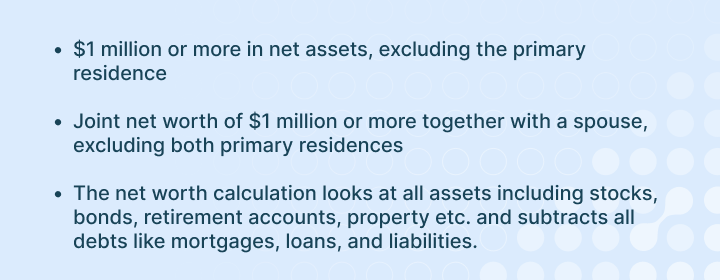May 2, 2025
An Investor's Guide to Unlocking Accredited Investor Status
Published on
May 2, 2025

Table of Content
What is an Accredited Investor?
Accredited investors meet qualifications and professional criteria to access exclusive investment opportunities. Designated by the U.S. Securities and Exchange Commission (SEC), they gain entry to high-return options such as hedge funds, venture capital, and private equity. These investments bypass full SEC registration but carry higher risks.
Accredited investors must meet income and net worth requirements, unlike non-accredited individuals, and can invest without limitations. However, investments lack transparency as companies are not obligated to disclose comprehensive financial information. Accredited investors must validate eligibility, demonstrating expertise and knowledge.
Requirements for Accredited Investor Status
Income Requirements
For individuals, the annual income requirement to become or qualify as an accredited, investor is:

Net Worth Requirements
For individuals, the net worth requirement is:

Entity Requirements
For companies, trusts, and other entities must meet the following requirements:
- Have total assets greater than $5 million
- Be an employee benefit plan with more than $5 million in assets
- Be a charitable organization, corporation, partnership, or business trust with more than $5 million in assets
- If you are a bank, insurance firm, brokerage firm or a registered investment company.
- Acquiring certifications, designations, or credentials such as a Series 7 Series 82 or Series 65 license.
- Being a knowledgeable employee of a private fund, meaning you have sufficient investing knowledge and experience.
- Being a high ranking member of the company issuing the securities.
- Having assets over $5 million under management if you are an investment adviser representative.
- Be a state or federal government agency So in summary, individuals need to meet income or net worth requirements, while entities need to meet asset size or entity type requirements to qualify as accredited investors. The SEC reviews these requirements periodically.
Recent Changes to the Definition of an Accredited Investor
Some key changes made in 2020 by the SEC include:
- Allowing natural persons to qualify as accredited investors based on certain professional certifications. Including the Series 7 Series 65, and Series 82 licenses or other credentials that show financial expertise.
- Adding limited liability companies and RBICs to the list of entities that qualify. This change recognizes that these entity types are often used for making investments.
- Allowing knowledge employees of private funds to qualify as accredited investors for investments in the fund. This change acknowledges the expertise that these employees develop.
- Including spousal equivalents in the calculation for joint income and joint net worth tests. This makes the accredited investor definition more inclusive.
- Indexing income and net worth thresholds to inflation every 5 years. This change accounts for the effects of inflation over time. These amendments expand the accredited investor pool by approximately 64 million Americans.
This wider access provides more opportunities for investors, but also increases potential risks as less financially sophisticated, investors can participate. Businesses utilizing private offerings may benefit from a larger pool of potential investors. Some detractors contend that the income and net worth requirements are still overly limiting.
Benefits for Accredited Investors
Access to Private Placements and Hedge Funds
One major benefit is the opportunity to invest in placements and hedge funds. These investment options are exclusive to accredited investors and institutions that qualify as an accredited, per SEC regulations. Private placements enable companies to secure funds without navigating the IPO procedure and regulatory paperwork needed for offerings. This gives accredited investors the chance to invest in emerging companies at a stage before they consider going public. Hedge funds employ alternative investment tactics such as cross-selling, leverage, derivatives and arbitrage. They are viewed as investments and are accessible only, to qualified clients.
Early-Stage Investment Opportunities
In addition to known companies, qualified investors can choose to invest in startups and up-and-coming ventures. This offers them tax returns and the chance to enter at an earlier stage and potentially reap rewards if the company prospers. Naturally, investing in startups carries a level of risk so conducting research is crucial. However, for investors open to the risks involved, backing startups can lead to gains. Many of today's tech companies such as Facebook, Uber and Airbnb originated as early-stage startups supported by accredited angel investors.
Potential for Higher Returns
Sophisticated investors have the chance to explore investment options that may yield more profits than what public markets offer. Private equity funds, hedge funds and venture capital for high growth startups present potential. Although returns are not assured, diversification and portfolio enhancement options are expanded for investors. By diversifying their portfolios through these expanded investment avenues accredited investors can enhance their strategies and potentially achieve superior long-term returns with proper risk management.
Risks and Considerations for Accredited Investors
Seasoned investors often encounter investment options that may not be easily available to the general investor. Nonetheless, these investment prospects carry risks that accredited investors must carefully evaluate.
Higher Risk Investments
Investment options and securities offered to accredited investors usually involve higher risks. For example, private equity, venture capital and hedge funds often focus on investing in assets that carry risk but can be liquidated easily for the possibility of greater returns on those risky investments. Researching before investing is crucial these in scenarios.
Lack of Liquidity and Transparency
Accredited investors should have other liquid income as the invested capital can be tied up for long periods. Lock up periods prevent investors from withdrawing funds for more months and years on end. There is also far less transparency and regulatory oversight of private funds compared to public markets. Investors may struggle to accurately value private assets.
Why You Should Conduct Due Diligence
When dealing with risks accredited investors need to assess any private investments and the fund managers involved. They should review historical performance data, fee arrangements, investment approaches and risk management strategies. Accredited investors are expected to possess the knowledge and resources necessary to conduct adequate diligence. Depending on marketing materials can expose investors to significant financial losses.
In essence, while being an investor provides access to opportunities it doesn't guarantee profitable investments. Accredited investors must carefully consider the heightened risks and lack of liquidity, in markets when building investment portfolios.
The Future of Accredited Investor Regulations
Potential Changes and Reforms
- Broadening the scope to encompass groups of investors is determined by knowledge rather than solely by income and assets. This adjustment may extend accredited investor status to a range of people.
- Updating the income and asset benchmarks for inflation to ensure they reflect changes as time progresses. The current thresholds have stayed static since 1982.
- Permitting partners in committed relationships to combine their resources for shared eligibility as accredited investors. This would help couples where one spouse has a lower income qualify.
- Enabling individuals with certain professional certifications, such as Series 7 or CFA, to qualify as accredited investors. This would recognize financial sophistication.
- Creating additional requirements such as proof of financial literacy or successfully completing an accredited investor exam. This could ensure investors understand the risks.
- Limiting or eliminating the primary residence from the net worth calculation to reduce potentially inflated assessments of wealth.
Impact on the Investment Landscape
- Broadening the group of investors might enhance the availability of investment opportunities to a wider range of people.
- On the other hand, it could also result in experienced investors assuming excessive risks that may not be suitable for them. So, safeguards may be needed.
- Existing accredited investors may face increased competition for the best investment opportunities if the pool grows.
- Companies raising funds may benefit from an expanded accredited investor base to draw from.
- Overall private capital formation could increase as more investors can participate.
Adapting to the Evolving Rules
Those who are currently considered accredited investors must stay updated on any alterations to the criteria and regulations. Their eligibility might be subject to modifications in the future. To maintain their status as accredited investors under a revised definition adjustments may be necessary in wealth management tactics. Businesses seeking accredited investors should stay vigilant about these updates to ensure they are attracting the right audience of investors. Educating investors will play a role in ensuring that those who attain term accredited investor comprehend the associated risks and duties.
The SEC is expected to make adjustments to the accredited investor criteria and definitions to align with trends and adapt to advancements in financial innovation and technology. This could lead to both prospects and challenges for investors and issuers operating within the securities sector. Both accredited investors and companies raising funds should stay informed and adaptable.



